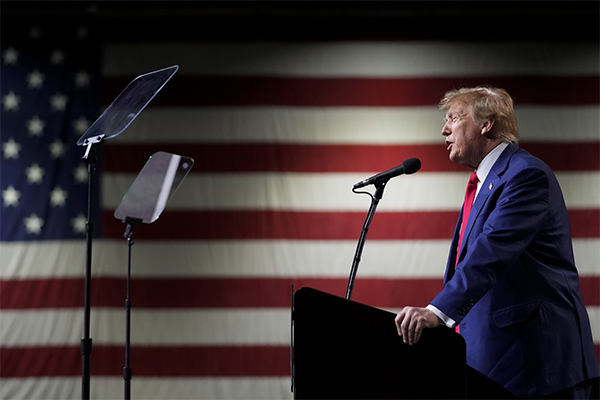How might the Supreme Court approach the Colorado ruling on Donald Trump’s ballot eligibility?

The U.S. Supreme Court “really has no choice” but to review the unprecedented ruling by the Colorado Supreme Court this week that Donald Trump is ineligible to appear on the state’s primary ballot because he engaged in insurrection, a Northeastern law expert says.
If the Colorado decision were to remain in place, and other states began stripping Trump from their ballots, the political ramifications would ripple across the country, according to Jeremy R. Paul, a professor of law and former dean of the Northeastern University School of Law.
“The fallout of the courts taking someone off the ballots who is so popular would create a huge political crisis in the country,” he says.

Northeastern legal experts describe the Colorado decision as a “seismic moment” in U.S. political and constitutional history, one that now puts the Supreme Court in the unique position of having to decide the political fate of a former president who installed several of its own members.
The ruling also sheds light on a little-known clause in the 14th Amendment that’s never before been tested at the highest echelons of power in U.S. history, one dealing with the ability of individuals who have engaged in “insurrection or rebellion” to run for high office.
Featured Posts
Section 3 of the 14th Amendment reads: “No person shall … hold any office, civil or military, under the United States … who, having previously taken an oath … as an officer of the United States … to support the Constitution of the United States, shall have engaged in insurrection or rebellion against the same, or given aid or comfort to the enemies thereof.”
“This case raises extremely complex questions precisely because we’ve never been here before,” Paul says. “There has never been a serious presidential candidate who has even arguably engaged in insurrection.”
How would the Supreme Court approach the Colorado ruling?
There are numerous ways that this case could play out. But Paul says the Supreme Court “really has no choice” but to review the matter, and in a timely fashion — not the least because it concerns ballot access in at least one state, and the front-runner of a major political party.
But it’s conceivable that the high court could try to duck the case, says Rose Zoltek-Jick, associate teaching professor and associate director of the Civil Rights and Restorative Justice Project at Northeastern.
“Election law is divided into different moments,” Zoltek-Jick says. “The moments surrounding primaries — which is where we are now — are matters wherein there is a lot of deference to the states.”
Zoltek-Jick says the insurrection clause in the 14th Amendment contains the phrase “hold office,” which begs the question: at what point in the pursuit of high office would the provision apply? She says a high court review would have to answer that question.
“The question of when is it an operative moment for the 14th Amendment to attach is an unexplored … phenomenon that the Supreme Court is going to have to face,” she says.
Paul says it is possible (but unlikely) that the court may wait for other jurisdictions to hear lawsuits related to the 14th Amendment before it decides to take up the question posed by Colorado. There are at least 16 states with pending litigation tied to Trump’s eligibility for high office, according to the New York Times.
But ducking the issue altogether would likely leave the Colorado Supreme Court’s decision in place, he says.
“Usually when the Supreme Court ducks a case, the prior decision is left in place,” Paul says.
The Colorado high court stayed its own decision until Jan. 4 pending anticipated appeals.
A question of what is federal law and what is state law
Paul says that Colorado’s high court ruling rests on a federal question involving the meaning of Section 3 of the 14th Amendment, as well as a second question of who exactly gets to decide whether to list the former president on the ballot.
While the first matter would fall under the Supreme Court’s purview, the second question is a state law matter, he says.
Editor’s Picks
The Colorado court ruling states that, under Colorado election code, “it would be a wrongful act … for the Colorado Secretary of State to list him as a candidate on the presidential primary ballot.” It does not, however, address the general election — nor does it mention potential penalties for disregarding the court’s finding.
“Everybody understands that when the case goes to the Supreme Court, the court is only allowed to answer questions of federal law, and that state law question should not be adjudicated by the Supreme Court,” Paul says.
Who gets to decide whether Trump violated the 14th Amendment?
Legal questions surrounding the execution and enforcement of Section 3 of the 14th Amendment have yet to be resolved because they’ve never really been tested before this moment, Paul says.
Who gets to decide whether Trump engaged in an insurrection leading up to the Jan. 6 attacks on the U.S. Capitol and therefore is barred from holding public office? In other words, is there an ultimate finder of fact?
That remains unclear.
“Is it the secretaries of state? Is it a jury? Is it the Congress?” Paul asks.
Even if there is a finding that says Trump cannot serve, the Civil War-era amendment gives Congress the authority to overturn said finding by a two-thirds majority.
Some legal scholars have argued that the insurrection clause of the 14th Amendment is “self-executing,” meaning that anyone who meets the criteria set forth in it is automatically disqualified, and that a finding saying as much from another legal body or authority — Congress, for example — is not required.
“That means that anybody anywhere in the legal system who looks at the evidence and concludes that Trump really did this should feel free to act on that finding, because the Constitution is instructing them to do so,” Paul says.











